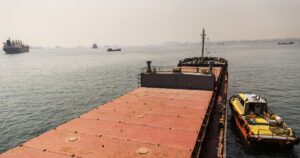
The Ukrainian Sea Corridor has transported 116 million tons of cargo since its launch, including almost 73 million tons of grain, said Oleksiy Kuleba, Vice Prime Minister for Reconstruction of Ukraine and Minister of Communities and Territories Development.
“Since the launch of the Ukrainian Sea Corridor, 116 million tons of cargo have been transported. Of these, more than 73 million tons of grain have been transported to the countries of Europe, Africa and Asia,” Kuleba wrote on Facebook on Tuesday following the visit of President of Ukraine Volodymyr Zelenskyy to Odesa region.
At the same time, since the summer of 2023 alone, Russia has fired more than half a thousand missiles at our ports and damaged about 400 port infrastructure facilities, Kuleba noted in his Facebook post.
Kuleba also took part in a working trip, the press service of the Ministry of Communities and Territories Development said in a statement.
The Deputy Prime Minister said that in Odesa, Zelensky held a meeting on the security situation in the region and its socio-economic development. The focus was on people’s safety, protection of the sky over the region from Russian attacks, the situation with grain exports, the work of regional enterprises and support for our people.
“It is also important for us to protect the port infrastructure. This is a matter of Ukraine’s economy and global food security,” Kuleba emphasized, noting that strengthening protection against constant Russian attacks and stable operation of the sea corridor is of course of interest to the region’s producers.
Work is currently underway to strengthen the air shield over Odesa region. The state is also constantly working on security guarantees, in particular at sea, in the sky, and on land, the Deputy Prime Minister said in a post.
In early March, the Ministry of Development reported that 106 million tons of cargo had been transported through the Ukrainian sea corridor during its operation, of which almost 70 million tons were grain.
It was also reported that on Tuesday, NATO Secretary General Mark Rutte visited Odesa together with Ukrainian President Volodymyr Zelenskyy.
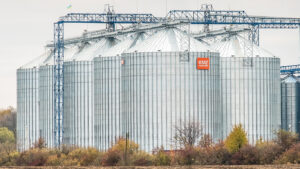
The elevators of the Agrotrade agricultural holding have already received more than 280 thsd tonnes of products in the season-2024-2025, which is 62% of the planned volumes, the company’s press service reported on Facebook.
According to the report, the elevators received more than 208 thsd tonnes of grain, almost 72 thsd tonnes of oilseeds, and about 17 thsd tonnes of other crops.
The agroholding cites difficulties in the labor market as one of the main challenges of the season.
“One of the problems we face is the shortage of technical specialists, including mechanics, electricians, and welders. To ensure uninterrupted operation, the company is actively recruiting new employees, including people of retirement age with relevant experience,” said Konstantin Vorona, Director of Agrotrade’s Production and Technical Department.
He noted that in the 2024-2025 marketing year, Agrotrade’s elevators are operating normally and steadily accepting both its own products and those of third-party agricultural producers.
The Agrotrade Group is a vertically integrated holding company with a full agro-industrial cycle (production, processing, storage and trade of agricultural products). It cultivates over 70 thousand hectares of land in Chernihiv, Sumy, Poltava and Kharkiv regions. The company’s main crops are sunflower, corn, winter wheat, soybeans and rapeseed. It has its own network of elevators with a one-time storage capacity of 570 thousand tons.
The group also produces hybrid seeds of corn and sunflower, barley, and winter wheat. In 2014, a seed plant with a capacity of 20 thousand tons of seeds per year was built on the basis of Kolos seed farm (Kharkiv region). In 2018, Agrotrade launched its own brand Agroseeds on the market.
The founder of Agrotrade is Vsevolod Kozhemiako.
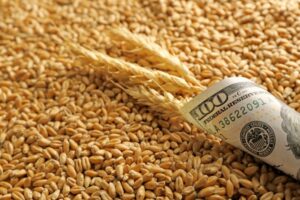
As of April 4, Ukraine exported 33.017 mln tonnes of grains and pulses since the beginning of the 2024-2025 marketing year, of which 232 thsd tonnes were shipped this month, the press service of the Ministry of Agrarian Policy and Food reported citing the State Customs Service.
According to the report, as of April 5 last year, the total shipments amounted to 36.028 mln tonnes.
In terms of crops, since the beginning of the current season, Ukraine has exported 13.254 million tons of wheat (141 thousand tons in April), 2.206 million tons of barley (0), 10.8 thousand tons of rye (0), and 17.061 million tons of corn (90 thousand tons).
The total export of Ukrainian flour since the beginning of the season as of April 4 is estimated at 54.1 thsd tonnes (in April – 0.7 thsd tonnes), including 50.2 thsd tonnes of wheat (0.6 thsd tonnes).

As of April 4, Ukraine sowed 926 thousand hectares of spring grains and legumes, up 8.7% year-on-year, and started sowing sunflower, the press service of the Ministry of Agrarian Policy and Food reported on Friday.
According to the report, 116.5 thousand hectares were planted with wheat (79.8 thousand hectares a week earlier), 551.8 thousand hectares with barley (315.5 thousand hectares), 164.3 thousand hectares with peas (102.9 thousand hectares), and 82.3 thousand hectares with oats (50.7 thousand hectares).
According to the Ministry of Agrarian Policy, Odesa region is the leader in terms of sowing rates, having sown spring crops on 92.3.1 thou hectares, Ternopil region – 87.4 thou hectares, Poltava region – 83.2 thou hectares, Mykolaiv region – 73.6 thou hectares, Vinnytsia region – 72.6 thou hectares.
In addition, 33 thou hectares have already been planted with sunflower, 64.8 thou hectares with sugar beet, and 2.6 thou hectares with soybeans.
The Ministry reminded that in general, in 2025, it is planned to plant more than 5.7 mln ha of spring grains and legumes, which corresponds to the level of 2024. The main feature of the new season will be an increase in the area under spring wheat by 28%, to 222.8 thou hectares. Such changes in the crop structure are in line with the stable demand from processing companies and exporters.
As reported, as of April 4, 2024, the total area under spring grains and pulses was 852.1 thsd ha. Peas were planted on 119.0 thou hectares, barley – on 543.2 thou hectares, wheat – on 118.3 thou hectares, oats – on 62.4 thou hectares.
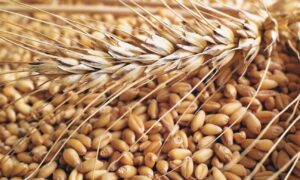
As of March 28, Ukraine exported 32.389 mln tonnes of grains and pulses since the beginning of 2024-2025 marketing year (MY, July-June), of which 3.206 mln tonnes were shipped this month, the press service of the
Ministry of Agrarian Policy and Food reported citing the State Customs Service.
According to the report, as of the same date last year, the total shipments amounted to 34.199 mln tons, including 4.529 mln tons in March.
In terms of crops, since the beginning of the current season, Ukraine has exported 12.997 mln tons of wheat (994 thsd tonnes in March), 2.206 mln tons of barley (62 thsd tonnes), 10.8 thsd tonnes of rye (0), and 16.72 mln tons of corn (2.14 mln tonnes).
The total export of Ukrainian flour since the beginning of the season as of March 28 is estimated at 53.1 thsd tonnes (in March – 4.5 thsd tonnes), including 49.2 thsd tonnes of wheat (4.4 thsd tonnes).
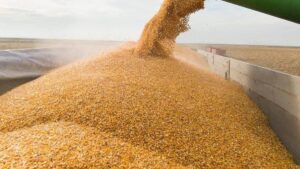
As of March 26, Ukraine exported 32.214 mln tonnes of grains and pulses since the beginning of 2024-2025 marketing year, including 3.032 mln tonnes shipped since the beginning of the current month, the press service of the Ministry of Agrarian Policy and Food reported, citing the data of the State Customs Service.
According to the report, as of March 27 last year, the total shipments amounted to 34.199 mln tons, including 4.529 mln tons in March.
At the same time, since the beginning of the current season, Ukraine has exported 12.912 mln tonnes of wheat (13.504 mln tonnes in 2023/24 MY), 2.196 mln tonnes of barley (1.957 mln tonnes), 10.8 thsd tonnes of rye (1 thsd tonnes), and 16.621 mln tonnes of corn (18.447 mln tonnes).
The total export of Ukrainian flour since the beginning of the season as of March 26 is estimated at 52.8 thsd tonnes (in 2023/24 MY – 78.1 thsd tonnes), including 48.9 thsd tonnes of wheat (74 thsd tonnes).